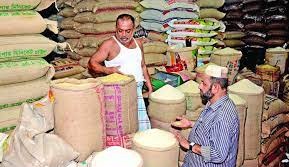
Rice prices up by Tk 3-5 per kg in peak season
Staff Correspondent ||
2022-05-25 01:39:09

Despite consumer expectations that rice prices would fall during the peak Boro season, much to their dismay, prices have actually risen by Tk 3-5 per kg across the country, including in the capital.
According to the Trading Corporation of Bangladesh (TCB), the type of rice which was sold at Tk 55-62 last year is being sold at Tk 58-68 this year, marking an increase of 8 per cent per kg.
Upon visiting various wholesale and retail markets around the capital, including the Babubazar, this reporter learned that before Eid-ul-Fitr, when the Boro season first began, rice prices dropped by Tk 2-3 per kg.
However, customers could buy rice at reduced prices for only a week after Eid before the prices began to rise back up again.
On Tuesday, the price of new Miniket rice was being sold at Tk 62-66 per kg, up from Tk 60-61 per kg. Meanwhile, the Nazirshail rice was being sold at Tk 66-72 per kg, which was earlier Tk 64-70 per kg. Besides, the BR 28 rice was sold at Tk 48-50 per kg, which was Tk 46-47 per kg.
When asked, Md Saifur Rahman, owner of Sufia Store in Maniknagar Bazar, said rice is in short supply in wholesale markets. “The price of rice in 25 kg sacks increased by Tk 150 in three phases till Tuesday following Eid-ul-Fitr.”
Meanwhile, in Naogaon markets, one of the largest markets for rice, Miniket rice was being sold at Tk 55-60 per kg, which was Tk 52-55 per kg 10 days ago.
T-Aman was being sold for Tk 44 per kg, up from Tk 40 per kg and Katari rice for Tk Tk 62 per kg, up from Tk 56 per kg.
Why did the price rise?
Paddy crops cultivated across the country have suffered extensive damage ahead of this year’s monsoon season from the onrush of water from the upper catchment in the haor regions, flooding in Sylhet, and incessant rains in other rice-producing districts.
Subsequently, farmers faced challenges in harvesting the standing paddy crops in time as paddy became submerged in floodwaters, resulting in crop losses.
Moreover, due to a labour shortage caused by the flood, the cost of harvesting and threshing paddy doubled.
Meanwhile, the lack of necessary dry and sunny weather hampered rice production by farmers and mill owners.
As such, the high production costs and low production volume have reduced the supply of rice, driving up paddy prices in the market.
Traders and mill owners attribute the rise in rice prices to the factors mentioned earlier.
Speaking to The Business Post, Farhad Hossain, general secretary of Naogaon district’s Rice Mill Owners’ Group, said paddy cultivated in the district could not be harvested properly from the fields this time due to the incessant rain, shortening the supply of paddy.
“The same type of rice we bought last year for Tk 1,100 per maund is now selling for Tk 1,350 this year,”
he said.
“Most of the paddy brought to the market by farmers is damp. As a result, returning them to mills and drying them takes a long time. As such, the longer production time is affecting the supply of rice,” he added.
According to local farmers, each bigha of land usually yielded between 24 and 25 maunds of paddy on an average. However, due to this year’s crop losses, they are only getting 16-17 maunds.
Furthermore, harvesting and threshing paddy per bigha used to cost Tk 4,000 last year, but now it costs Tk 7,000-8,000.
Meanwhile, agronomists claim that a handful of large corporations and rice mills are controlling the market.
Rice is being stockpiled in the hopes of raising prices. As a result, there is less rice available on the market.
Furthermore, rising international wheat and rice prices have had an impact on the domestic market.
Speaking on the matter, Agricultural Economist Jahangir Alam said the rice market, which is already dominated by a syndicate of the largest rice mills across the country, is now seeing large corporations enter.
“The rice mills and corporations are colluding with each other and hoarding rice in the hope of raising prices in the market. The reduced supply of rice has caused the price to go up,” he added.
Editor & Publisher: S. M. Mesbah Uddin
Published by the Editor from House-45,
Road-3, Section-12, Pallabi, Mirpur
Dhaka-1216, Bangladesh
Call: +01713180024 & 0167 538 3357
News & Commercial Office :
Phone: 096 9612 7234 & 096 1175 5298
e-mail: financialpostbd@gmail.com
HAC & Marketing (Advertisement)
Call: 01616 521 297
e-mail: tdfpad@gmail.com